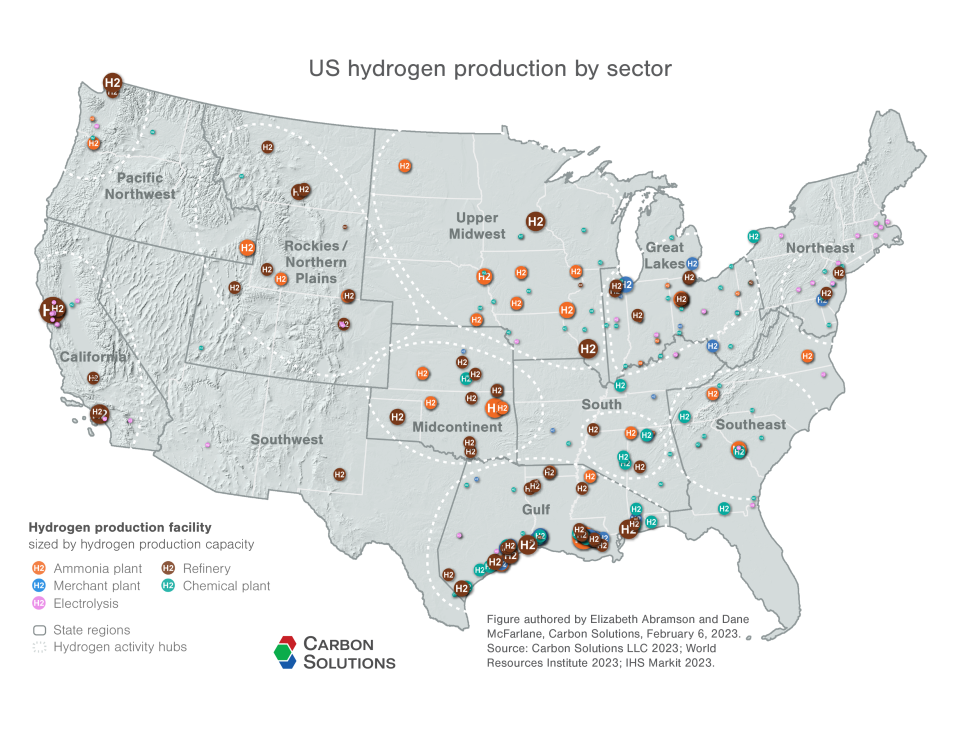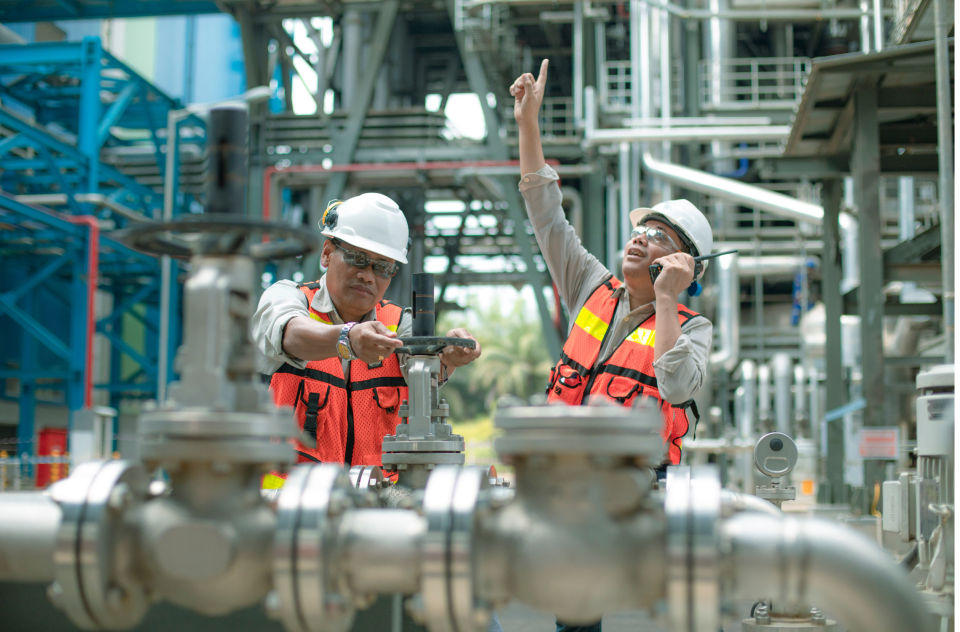Applications for the Regional Clean Hydrogen Hubs (H2Hubs) program are due today, April 7, marking the start of proposal review after months of activity at the state and regional levels. This fall, the US Department of Energy (DOE) will select six to 10 hydrogen hubs that will provide the connective tissue for a national clean hydrogen network. Linking hydrogen producers with consumers and associated infrastructure, these hubs are an innovative chance to generate jobs and economic opportunities for communities and businesses around the country.
Sometimes called the “Swiss Army Knife” of climate solutions, hydrogen is a molecule with the potential to replace conventional fuels in many fossil-intensive processes. Most hydrogen today is produced from natural gas or coal and used in industries like refining and fertilizer production. Producing cleaner hydrogen has the potential to cut emissions from a wide variety of heavy-duty industrial processes like steel and ammonia production. Cleaner hydrogen can also cut emissions for hard-to-decarbonize areas of transportation, such as aviation, marine shipping, and long-distance trucking, where few other low-carbon alternatives exist.
The use of clean hydrogen in traditionally fossil-heavy industries that are difficult to electrify could reduce total US emissions by 10 percent by 2050, according to US DOE. Accelerating low-carbon hydrogen production and use at the scale necessary to reach this milestone will undoubtedly necessitate the creation of new jobs. A workforce will be essential to support the production, consumption, and connecting infrastructure of a hub and the transition to clean hydrogen in heavy industry and transportation. The scale of this transition is massive. The development of these projects, from initial planning to full-scale operation, will take years of coordinated effort across all stakeholders.
As hub consortia prepare for the possibility of a clean hydrogen hub in their region, they must bring all stakeholders to the table and meaningfully involve local communities and organized labor in shaping the future of this clean hydrogen workforce. The present opportunity – to shape a hydrogen future built on meaningful workforce and community engagement – is too important to fail.
For its part, DOE can support the development of a clean hydrogen economy that centers high-quality, family-sustaining jobs by ensuring that the federal investments made through the H2Hubs program include concrete labor standards, including putting workers at the center of the equitable transition to new forms of energy production.
Building a community benefits plan
With the H2Hubs Program, DOE is funding a vision put in place over a year ago by the Bipartisan Infrastructure Law. H2Hubs is the department’s largest-ever demonstration program. Selection will hinge on projects that achieve the program’s set guidelines, including demonstrating a variety of feedstocks and end-uses. Ultimately, the program will create a network of regional clean hydrogen production, processing, delivery, storage, and end-use facilities geographically distributed across the United States.
Under the program, hub applicants must also prepare a Community Benefits Plan (CBP). The plan must describe how the proposed hub will incorporate community and labor engagement, workforce development, diversity, equity, inclusion, and accessibility, and the federal Justice40 Initiative. CBPs are key to outlining how a project will bring meaningful and intentional support to communities and workforce development. DOE has published guidance to help applicants structure these plans, which make up 20 percent of the technical review criteria for full applications. Other criteria factors include technical merit and impact, financial and market viability, an H2Hubs workplan, and a management team and project partners.
If supported by strong CBPs, hubs can connect the future of hydrogen in the United States with the organized labor movement. Concrete labor standards will be crucial to the program’s success.
Working with labor and frontline communities
As the decision-maker and program overseer, DOE can facilitate the connection between Organized labor and project developers by prioritizing applicants with concrete labor standards and a willingness to create high-quality, family-sustaining union jobs. A group of lawmakers have previously expressed the need for DOE to fill this role.
In early March, the Texas Democratic Congressional Delegation led by US Congressman Joaquin Castro sent a letter urging DOE to prioritize high-quality, good-paying union jobs in Texas with federal hydrogen hubs funding. In the letter, lawmakers outlined opportunities for the H2Hubs program to ensure robust labor practices that strengthen the economic success of a project.
Project developers have their own crucial role to play. Developers should have a plan to work with local labor groups and develop considerations that protect workers, such as:
- Written confirmation that H2Hubs will be a source of high-quality, family-sustaining jobs, (including medical benefits and pensions) within the hub’s locality;
- Signed Community Workforce Agreements with participating labor organizations and frontline community groups;
- Written Labor Peace Agreements for all operations and maintenance employees as they decide whether to form a union;
- Written plans for existing fossil fuel workers to transition into comparable hydrogen jobs.
The Bipartisan Infrastructure Law’s H2Hubs program presents a key opportunity to both reduce carbon emissions and support the future of the workforce critical to enabling this clean energy transition. The Inflation Reduction Act passed last year included an additional opportunity to ensure domestic hydrogen production is aligned with workforce development. The law included a production tax credit awarded based on the amount of greenhouse gas emissions from producing hydrogen. Hydrogen produced with the lowest emissions qualifies for the greatest credit value. Producers are eligible for up to five times the base credit value, should prevailing wage and apprenticeship requirements be met. This marks one of the many ways the government can incentivize worker benefits and ongoing training for the jobs that will form the backbone of the hydrogen economy.
Importance of place
As the next few months of decision-making around H2Hubs unfold, transparency and coordination around the intentional engagement of labor and community voices will be key to standing up durable projects. DOE sent letters of encouragement to 33 hub partnership applicants to submit a full application by DOE’s April 7 deadline, spanning every region of the country.

Due to the diversity of geography and end use for each hub selection, the local hydrogen workforce for each project will vary on union density, workforce demographics, benefits expectations, workforce development and training, and prevailing wages. H2Hubs can make use of local union apprenticeship programs, community-based organizations, and existing state efforts and relationships with labor, communities, colleges, and universities to support a hydrogen economy in their region.
As states develop their hydrogen economy and workforce, public and private sector partners can consider best practices for labor and workforce engagement, to ensure that the transition to hydrogen centers long-term workforce investment and includes disadvantaged communities in the buildout of a national hydrogen economy.
Keep up to date with future announcements and hydrogen news by signing up for the Industrial Innovation Initiative and the Carbon Action Alliance’s monthly newsletters.

